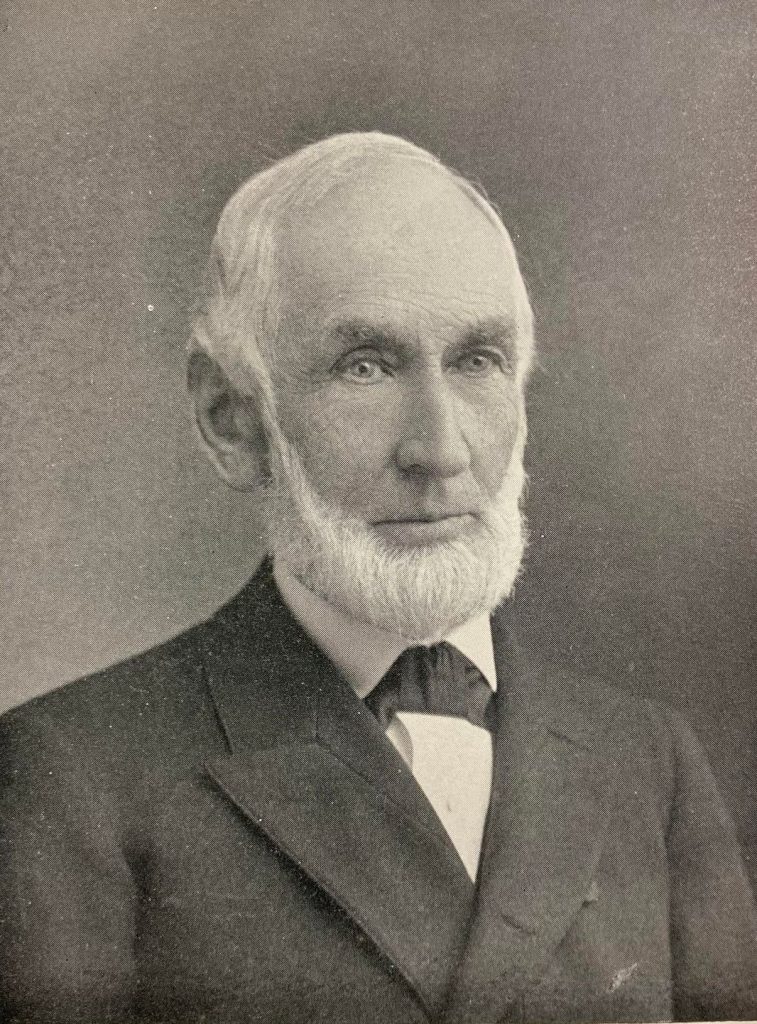
On December 18, 1823, on a farm in Onondaga County, a son was born to Waterman Phillips and Rachel Kinney. This child was the youngest in a family of ten children, and his legacy to Homer would be one of significant importance and have a lasting impact far beyond his own lifetime.
Waterman and Rachel Phillips both hailed from Connecticut, and they moved to Cortland County sometime before 1800. They initially settled near today’s Blodgett Mills, but they moved around within the county before deciding to move on to Onondaga County, where they would stay for the next 25 years. This is where George W. Phillips was born and raised, and where his mother would die in 1833, when George was about ten years old. Waterman moved back to Cortland County in 1836 and settled in Scott, where he stayed until 1852, at which time he moved to Homer until his death in 1861.
George attended public schools as well as the Cortland Academy. The boy was hired as a teacher and spent seven seasons in this capacity. (Note: the reference to seasons could be because school was more seasonal in nature in the 19th century due to children being needed on their homesteads for planting and harvesting. School did not run continuously like it does now.) At just 21 years of age, George was elected as the superintendent of schools for Scott, an office he held for two years. This feat was unusual for someone so young, but he had proved himself a competent educator and was recognized for his diligence.
Though education was important to Phillips, he left the field and spent the next decade or so in farming, instead. In 1850, he married Abby Rhodes, and around this time, the couple moved to Homer. George began a mercantile business here, and due to his “careful economy, shrewd management, and fair dealing,” his business would thrive for 35 years. Only one child was born to George and Abby, a little girl they named Ellen Frances, who was born in 1851.
Phillips was an early supporter of the Republican party and signed the first call for its organization in the county. In 1861, he was elected as the supervisor of the town of Homer, an office he held for five years, the duration of the Civil War. During the war, it was the duty of town supervisors to fulfill the quota for men and munitions required. As supervisor, George was also required to manage immense sums of money for the war effort. He was on several committees of the county board of supervisors, and he was the chairman of the committee of military affairs. He was the only member of the committee to serve for the duration of the war. Phillips took a year off from the board of supervisors and was reelected in 1867. He then served in this capacity for another four years.
George W. Phillips was a civic-minded man, and his sense of duty did not stop at helping his town. He was elected as a member of the New York State Legislature for a term from 1873 to 1874. It was the first time in 40 years that someone from his district had been elected to a seat, so that speaks to his reputation and abilities. His constituents felt he was the right candidate for the job due to his advocacy for what was right and for the responsible financial oversight Phillips endorsed for the people’s purse.
Back on the home front, Phillips was not only involved in the organization of the Homer National Bank in 1884, but he was also instrumental in the organization of the First National Bank of Homer. Due to his deep interest in education, he was a trustee of his alma mater, the Cortland Academy, as well as the Homer Academy and Union School. George served on the building committee, which replaced the academy after it was destroyed by fire in January of 1893.
The most significant contribution made by George W. Phillips to Homer residents was the construction of a library, a goal he had long aspired to for his community. After a lifetime of hard work, he had the means to invest in an institution which would touch the lives of citizens for years to come. In 1900, Phillips secured a site in the village, and a foundation was laid in 1901. Delays with building materials caused construction to halt, and sadly, George died on February 19, 1902. By this time, his beloved wife Abby, had also passed away, and the responsibility to complete the library and carry out her father’s dream fell to Ellen. Dutifully, Ellen carried out her father’s fondest wish, the building was completed, and the dedication was held on June 11, 1903. Ellen’s obituary indicated that she was a generous friend to the library in her lifetime; she was charitable, had a rich store of friends, and always used her influence for good. George would have been proud of his daughter.
This line from the biography of George W. Phillips sums up a life lived in service to his fellow citizens, past and present: “He has made his life of use to himself and to all who have come within the range of its influence.” George, Abby, and Ellen are all interred at Glenwood Cemetery.
~ Tabitha Scoville, Cortland County Historical Society Director
